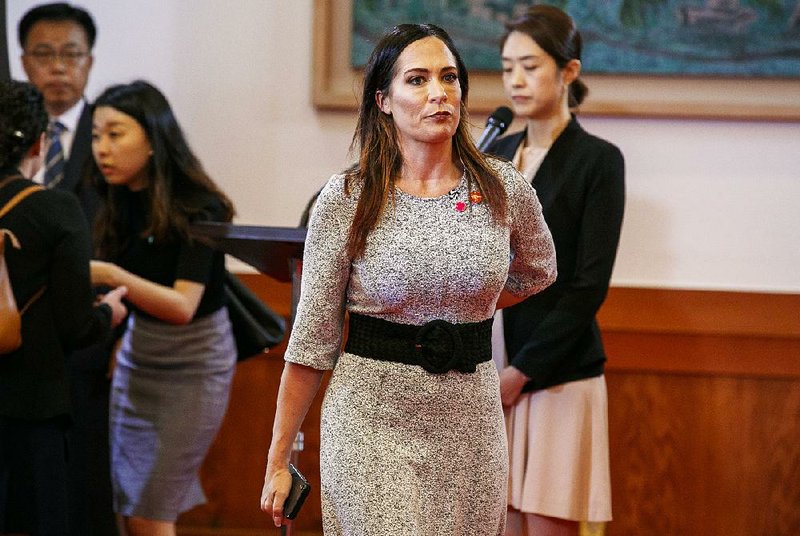WASHINGTON -- Stephanie Grisham, the new White House press secretary, returned from the Demilitarized Zone with a bruise on her arm after physically pushing North Korean officials to clear a way for American journalists to cover President Donald Trump's meeting with the North Korean leader, Kim Jong Un.
In a video of the clash, Grisham can be seen -- iPhone in one hand -- wedging her body between a railing and a throng of men crowding a hallway. "Go," she commanded a group of journalists as she held back the North Koreans, opening a path for the journalists.
Making her first mark in the job by fighting, physically, for press access, Grisham offered a stark contrast to how Sean Spicer, Trump's first press secretary, introduced himself to the world when he assumed the same position. Spicer stood at the White House lectern and insisted that Trump's inauguration crowd drew the "largest audience to ever witness an inauguration, period, both in person and around the globe." He then refused to take questions.
Sarah Huckabee Sanders, who followed Spicer in the job, was best known for phasing out the daily White House news briefing (it had been more than 100 days without a briefing when she left the building last week), and for suspending the press credential of a pesky television White House correspondent, Jim Acosta of CNN, who had angered the president. A judge later ordered it reinstated.
Abroad, Sanders was responsible for barring four American journalists from covering Trump's dinner with Kim in February in Hanoi, Vietnam, after two of them called out questions during an earlier appearance by the president.
The antagonistic relationship between the news media and Trump, who regularly refers to journalists as the "enemy of the people" and tries to discredit stories he does not like as "fake news," is set from the top. And 2½ years into the administration, that dynamic is seen as unlikely to change significantly, no matter who sits in the press secretary's office.
But in a White House that is often driven by how events are covered, Grisham's first big move on the job she assumed less than a week ago -- a body slam for press access -- was seen as symbolically important.
"It was laudable and heroic, what she did, in terms of providing press access," said Robert Gibbs, who served as press secretary to President Barack Obama. When traveling overseas, Gibbs said, the press secretary's job is primarily to ensure that U.S. journalists have access to see and hear the president.
"Often, your job is to be what she was -- a blocker, literally in this case, to make sure that access for U.S. journalists is guaranteed," Gibbs said. "The idea of fighting for that access is quintessentially American. It was a great start for her."
Since Sanders announced her resignation, White House officials have been discussing whether to reinstate the daily news briefing. Grisham declined to comment about issues of access or the status of the briefing. In South Korea, Grisham was trying to prevent the North Koreans from overcrowding the room with their own reporters before American journalists could gain access, a White House official said. She and other White House officials worked together as a team to control the situation.
And White House officials said it was too soon to draw any grand conclusions about what changes Grisham -- who was seen as a combative defender of her former boss when she served as communications director for the first lady, Melania Trump -- would seek to institute now that she occupies the dual role of White House communications director and press secretary.
"It is the press secretary's responsibility to fight, typically verbally, for press access," said Ari Fleischer, who served as press secretary to President George W. Bush. "It's rare that they have to go above and beyond and engage in physical action to preserve access. Robert Gibbs did it, and now Stephanie did it. It looked like it was natural and spontaneous, and good for her."
Fleischer said he did not expect the "multiyear hostility" between Trump and the news media to dissipate. But, he said, "if she can carve out a role where on a personal level, she likes the press and the press likes her, it can go a long distance."
A Section on 07/02/2019
